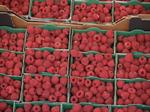How to Harvest Berries

WHEN DO YOU PICK BERRIES?
The indicators of ripeness can vary between berry types. The producer needs to be cautious about applying a general set of ripeness indicators. Colour can be a primary indicator of berry ripeness, but, it is not always completely reliable. An experienced grower will come to recognise the characteristics of colour change that are applicable to the berry they are growing. Often, instead of looking at overall colour, the grower will look for telltale colour changes at the poles of the fruit. For example, a green berry may develop a white or coloured star at its base, indicating the beginning of the ripening process.
This subtle but specific colour change may be enough to indicate to the grower that he should prepare for harvesting.
Ripening of the entire berry crop can occur within a relatively short period. This can be beneficial to the grower in that they are able to organize and conduct the harvest over a finite period of time, possibly just a few weeks. The harvest is usually the most labour and resource intensive part the entire production process. This can be true with both manual and mechanical harvesting. Modern harvesting techniques that utilize machinery specifically design for each type of berry type can greatly decrease either time or effort with the actually fruit picking and packaging. However, labour is still required to prepare the machinery, prepare the field, sort and grade the harvested crop and maintain the equipment in optimal running order. Often temporary labour is employed, whether it is for manual picking or mechanical harvesting. The harvest can be the most expensive time of the year for the producer. In tight markets, the farmer will find it essential receive maximize value for the crop in order to cover costs and provide income.
Another advantage to a short, distinct harvest period is the opportunity for the producer to actually remove the crop from the field after they feel that they have taken enough fruit. Usually the farmer will not wait for the entire crop to have ripened and have picked every last berry. A timely 90% yield can be beneficial economically than a protracted 100% yield. The grower will call and end to the harvest, release the temporary staff, and proceed with preparing the field for another crop. Depending on the climatic characteristics of the region i.e. frost dates a strawberry grower may be able to get two good crops in one season. The second crop and subsequent second harvest may actually be very profitable to the producer if they can take advantage of elevated off-season prices.
The scientific reason behind the relatively short period between the beginning and the end of ripening process in an entire berry crop can be complex. Essentially, ripe berries tend to cause other berries in the field to accelerate their ripening. As berries reach a state of peak ripeness they produce hormones that actually can become airborne. An important compound in the ripening process of many fruit is the hormone, ethylene. Ethylene is produced in larger quantities by ripe fruit compared with unripe. This organic compound is a gas and so can easily move throughout a crop. The result of elevated levels of ethylene surrounding fruit is that it tends to increase the rate of ripening. Ripe berries producing ethylene, and other volatile compounds, have the effect of causing the entire crop to ripen more quickly than it would of without the presence of these compounds in the air.
The post-harvest environment of the berry is vital to its shelf life. Ethylene, for example, is an important consideration in the post-harvest life of berries. Harvested fruit that are kept in non-ventilated environments may be exposed to elevated ethylene levels and, hence, unwanted accelerated ripening. Temperature and humidity levels will affect both the rate of metabolism of the ripening fruit and, also, possibly favour pathogens that cause spoilage.
You may also be interested in....
Exceptional training for a serious business or career -lots of different options to specialize.
View Course